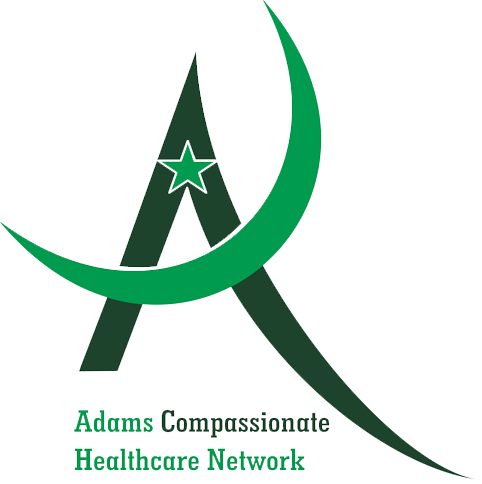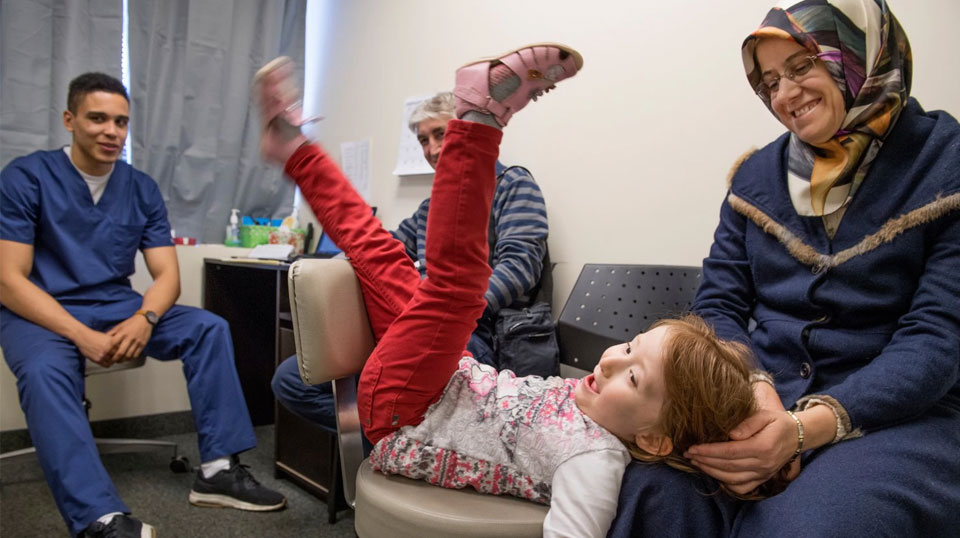The mosque in a squat, brick industrial park in Northern Virginia was bustling Saturday morning.
Women in springtime-colored hijab walked through the door. Women with no headscarves, too. There were old men, a couple speaking Spanish and 3-year-old redheaded twins who whirled like little tornadoes through all the rooms.
And yes, some were from the very countries whose residents the Trump administration — once again — wants to ban from entering the United States. Because who knows what they are doing in those mosques?
Let’s take a look.
[Bigotry smokescreen: Disguising anti-Muslim bias with land-use objections]

When you walk into the mosque’s offices, you see a large mural with Arabic writing translated into English: “Peace Be Upon You,” it says.
Deeper inside, there is a cavernous prayer room carpeted in red. But when the azan, the call to prayer, sounded, no one moved from the mosque’s offices. They were worshiping at the house of Metformin, Amoxicillin and Lisinopril.
Because all the activity at the All Dulles Area Muslim Society’s branch in Chantilly? It’s a free medical clinic.
The ADAMS Compassionate Healthcare Network has been open for nearly three years and has treated hundreds of patients, including refugees, day laborers and military veterans.
America is a land of hundreds of hospitals and clinics named for sisters and Christ and crosses and mercy. Now joining them are about 25 free clinics nationwide run primarily by Muslim volunteers, according to the American Muslim Health Professionals’ task force on health affordability.
Some, like the Al-Shifa Clinic in San Bernardino, Calif., or the Muslim Community Center Medical Clinic in Silver Spring, Md., have been around for years. A few others — in Florida, Oklahoma, Washington — opened within the past year at a time when their religion is under siege.
[Attacks on American Muslims grow uglier by the day. It must stop.]

ADAMS, Northern Virginia’s largest mosque, has been operating its clinic for three years.
“It’s for anyone,” said Bazigha Hasan, one of the founders. “There is so much need, and we have people who want to give.”
It’s that simple for Hasan, whose day job is at Fort Myer, where she is a civilian doctor to those serving our country. At the clinic, many of her patients can’t afford medical care.
Virginia is one of the states that refused to expand Medicaid through the Affordable Care Act, denying coverage to about 423,000 Old Dominion residents without insurance.
And that’s the part that drives the volunteers: the people in need.
The mosque donates only space, not money. And the clinic doesn’t take any government funding, so it can treat anyone. Although the clinicians don’t keep track of patients’ religions, it’s easy to see they care for people from all sorts of backgrounds. Since the clinic opened in 2014, they’ve treated nearly 2,400 patients, 62 percent of them women.
Hasan and the other doctors, nurses, therapists and medical assistants aren’t volunteering at the clinic to show dubious Americans that Muslims are good people. And they’re certainly not doing it to explain the tenets and practices of Islam.
“We don’t really talk about that,” Hasan said. “Mostly, they are just happy to have someone who will take care of them.”
Saturday morning offered a slide show of global geopolitics.
Immigrants from Kazakhstan came in at 10:30 a.m. seeking treatment for a grandma with high blood pressure and diabetes.
Inside his exam room, Mahsin Habib pantomimed hiking as a good form of exercise for a diabetic patient.
“I speak Kazakh, like this,” he explained. “We speak all the languages here. Sign language.”
“Just 15 minutes of walking every night will make a big change in those numbers,” Habib said, explaining the ways that Grandma, who recently came to the United States from Kazakhstan to help care for her grandchild, can help lower her blood sugar and blood pressure with exercise.
And the daughter, who works as a physician assistant in Virginia, turned to her mother to make sure she understood.
For some recent immigrants, this is the first time they are receiving preventive health information.
The free clinic is often a showcase of poor medical access in other countries, too, not just this one.
Habib saw a woman on Saturday from the Dominican Republic who had a lesion on her face return years after doctors there treated it incorrectly.
Ophthalmologist Omar Chaudhary recently helped a woman from Tunisia get corrective eye surgery after doctors there botched a cataract operation on one of her eyes.
Later that day, Habib saw the 3-year-old twins. They had developed skin rashes and asthma since their arrival in the United States six months ago from Istanbul.
Their father, a marine engineer, came to Washington on a work trip but is hoping to stay because of political unrest in Turkey.
Habib suggested that the family switch the twins to organic milk or milk from grass-fed cows to more closely resemble the all-natural dairy products they had in Istanbul.
“It’s more expensive, I know,” Habib said, as the twins climbed his exam table, spun around and shredded tissue paper. “But that will be better for them.”
Aydin Cengiz thanked the doctor and staff for all their help while trying to keep the twins on a straight path to the door, past the toy corner, past the water cooler, oops, keep the screen upright. Not in the lab! One more round of thank yous, and they finally got out the door.
(And maybe the staff thanked Allah for their safe departure.)
The thank yous are what make the clinic run. The doctors said the gratitude they receive from patients is unlike anything they hear in their private practices.
One patient immediately returned to the office with a cake she had bought with what little money she had. Others send cards and notes, handmade gifts.
Gratitude for the medicine. Gratitude for listening. Gratitude for opening their eyes. Gratitude for a simple act of love amid a world filled with too much hate.
Source: The Washington Post


The example about the mattress sizing page you mentioned in the last WBF can be a perfect example of new keywords and content, and broadening the funnel as well. I can only imagine the sale numbers if that was the site of a mattress selling company.
The example about the mattress sizing page you mentioned in the last WBF can be a perfect example of new keywords and content, and broadening the funnel as well. I can only imagine the sale numbers if that was the site of a mattress selling company.
The example about the mattress sizing page you mentioned in the last WBF can be a perfect example of new keywords and content, and broadening the funnel as well. I can only imagine the sale numbers if that was the site of a mattress selling company.
The example about the mattress sizing page you mentioned in the last WBF can be a perfect example of new keywords and content, and broadening the funnel as well. I can only imagine the sale numbers if that was the site of a mattress selling company.